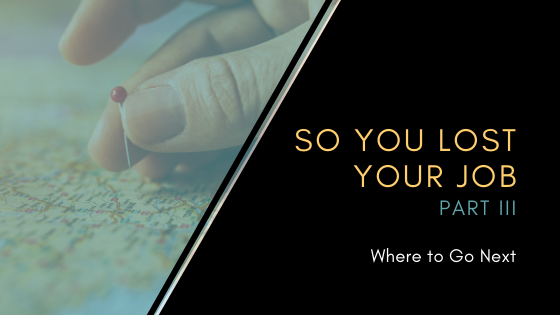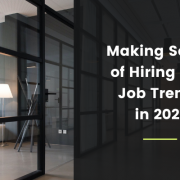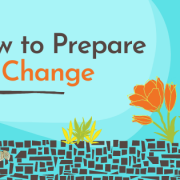So You Lost Your Job, Part 3: Where to Go Next
Career Tip Changing Careers Leaving Your Job
In the last two articles, I talked about a few things you should do right after you’re let go, and I shared some tips on how to cope with job loss.
And now you have a choice on what to do next. Do you immediately hunt for a new job in your current field? Or do you take a little more time to build up to your dream job, one that will make you happier but will also take a little more time and effort to achieve? This could be in your field but at an organization or level that you’ve had your eye on for a while. This could be in an adjacent or completely new field.
Of course, I can’t tell you what to do. I don’t know anything about your situation or goals in life. But I can certainly point out questions you should think on to help you make your decisions.
The main thing to consider is your resources: can you afford to not have a job for the next three, six, or nine months (or at least not a full-time steady income)?
If things are too tight
If not enough money is saved and you have too many nonnegotiable expenses (feeding your family, keeping a roof over everyone’s head), then by all means, go search for a job. Like right now. I have a few blog posts about how to do that that certainly still apply in the pandemic times.
Basically, you’ll still want to use your connections more than job postings. Everybody is looking out for their community right now, so reach out to friends, family, acquaintances, connections—there’s no reason not to tell everyone that you’re looking for work. It might feel strange at first—like you’re shoehorning it into a conversation or are asking for pity or help—but only the latter is true. And you’d be surprised at how much people want to help others. Make sure to be clear about what you’re looking for, whether job openings, connections, information, or whatever; you don’t want to waste other people’s time.
If you find yourself in front of your internet browser with 20 tabs open to differ job listings—close your browser, walk away from your computer, and take a deep breath. Sticking to just job posting sites is only going to make you more anxious, and you’re not able to do your best work when riddled with anxiety.
If you have a little wiggle room
If you have some savings, if you and all your dependents can survive on a cut budget, or if your partner or family can take on payments, then you can take a second to breathe and recoup.
I recommend reading Bill Burnett and Dave Evans’s book Designing Your Life. These two designers lead their readers through various steps on how to brainstorm, prototype, and get the life that you want. You can also always hire a career coach who will work with you one on one on how to find the career you’re craving.
Here’s the basics of how you’d go about switching careers right now.
1. Research the new industry you’re interested in.
Since things are a bit rocky and uncertain right now, you should probably avoid entering an industry that is faltering in the current economic climate. If you’ve always dreamed of opening a little neighborhood restaurant, maybe set that plan aside for a year and take a tangential job, like a manager position where you learn more about inventory.
2. Talk to people in the industry.
Yes, you should start researching on Google and industry-related sites. But by talking to people, you’ll get a clearer picture of what work is like in their industry.
The old standby was to ask people out for coffee to pick their brains, but obviously that’s not an option right now. You might think that asking for a Zoom chat feels too personal or intrusive. Emailing might also put you off. If you’re thinking along these lines, however, you’re severely underestimating how much most people want to help others. Also, chatting with you can make someone feel special (who doesn’t want to be thought of as a leader in their field?). Plus, it can add clarity to their lives as well.
So do your research, find people who do what you want to do or work where you want to work, and reach out to them. It’s not too difficult to cold message someone these days.
3. Start prototyping.
Each of the steps suggested here are based in action, and this one is doubly so. You need to start doing in order to get to where you want to go.
Which steps you should take will depend on what you’re interested in. For example, if you’re interested in switching to marketing, volunteer to help with someone’s marketing or social media campaign. A lot of nonprofits could certainly use the help (Idealist.org and VolunteerMatch.com are good places to start). Or if you know people at a startup, you could offer discounted services. Or you could work as a marketing assistant for a freelancer to learn the ropes.
If your ideal job is just a little out of your reach, consider signing up for some type of training: online courses, seminars, bootcamps, or even going back to school. For example, if you’re looking into coding and website development, there are plenty of coding bootcamps out there. And always ask about scholarships and deferred payment plans—it never hurts to ask, and you’d be surprised at your options.
4. Learn how to connect your past with your future
Knowing how to apply your current skills with new ones needed for your future career will be key. You’ve gained a lot of “soft” skills already, wherever you are in your career, and chances are they can be useful in your next job—they may even help you stand out among “typical” candidates.
For instance, if your last role involved keeping up the communication between departments, you can highlight your writing or speaking, organization, and team-player skills. The site Indeed offers a deeper look at soft skills, which ones are in high demand, and how to showcase yours.
Own your story. Create meaning.
No matter which direction you go, take action and give it meaning. By staying active, you fight off the negative thoughts and worries. Start your day with a manageable list of tasks to do. This could be filing for unemployment each week, sitting down to budget for the coming month, learning a new skill for future job prospects, emailing an old coworker, heck, even doing the dishes. Every action to take to stay on top of this setback helps in the short and long run.

I’m Stacey Lane: Career Coach | Transition & Career Strategist | Personal Brand Specialist
I help individuals with unique backgrounds find their perfect fit and effectively market themselves so they find work that is as interesting as they are.
Contact me to get started!



